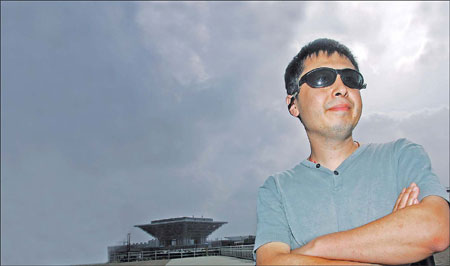One of China's most prized movie directors, Jia Zhangke will delve into Shanghai's rich past, ever-changing present and prosperous future for a documentary that will serve as a tribute to the city's 2010 World Expo.
|

Director Jia Zhangke |
Shanghai Legend, slated for international release next April, just ahead of the expo, is set to detail the legacies of prominent leaders in Shanghai's history and expose the untold stories of everyday people.
But many doubt the documentary will be able to compete with Jia's past masterpieces. In a bid to appease expo organizers in charge of giving the film a green light to screen at the expo garden, Jia is taking a more cautious approach after being hand-picked for the job by government officials and expo authorities.
"In the past I focused on demolition," said Jia. "This will be the first time I concentrate on construction."
The film, which has so far been three years in the making, takes place largely on the Chinese mainland, centering on the emerging expo garden, but parts of it will also showcase Hong Kong, Taiwan and North America. The period it covers stretches from the late Qing Dynasty (1644-1911) to the present day.
A sixth-generation Chinese filmmaker, the 39-year-old is considered something of a former rebel. He worked outside the country's tightly controlled State-cinema for years until receiving licensed approval to film independently in 2004.
Yet Jia shied away last week from commenting on how the film's exploration of the city's tumultuous past would compare with his previous works, which exploit the disarray beneath the surface of the nation's economic miracle. Jia simply said the world would have to be patient in "waiting for the outcome".
Shanghai Legend Producer James Xu said the film uses a different approach than that seen in Jia's previous productions.
"We will not produce anything the government does not like," said Xu. "We have a common goal of being harmonious."
Another sign of the film's official backing is seen through the involvement of Chinese officials. Its title was handwritten by Gong Xueping, a member of the Standing Committee of the National People's Congress, also a former political heavyweight in Shanghai.
Speaking about the film, Jia went on to say that it ultimately aims to explore the destiny of each individual presented.
"Everyone has his or her own story about Shanghai," said Jia. "It is the people tied to the historical events of Shanghai who are closely connected to the make-up of modern China. It's all about tracing the human footprints of Shanghai."
Because Shanghai Legend, to be released by the Shanghai Film Group Corporation under the Shanghai Documentary Studio, will follow a production style similar to Jia's 2008 film 24 City, the content will emerge through a series of consecutive interviews.
Some 100 important figures will be interviewed, including former underground Communist Party members, researchers, industry workers, movie stars and new immigrants to Shanghai. But only a select few will make the final cut.
The first interviewee, however, has already been determined as Lu Zhenxiong, the grandson of novelist Lu Shi'e, who one century ago predicted Shanghai would host the World Expo. Lu went as far as naming Pudong New Area as the future location of the expo and even made claims about the fortunes that would one day be exploited in Lujiazui and its surrounding areas.
A native of Shanxi province, Jia's signature motif is exploring the lives of the impoverished folks who live amid increasingly materialistic societies. His first feature, Xiao Wu (1997), observed a small-town pickpocket as he struggled to adapt to the rising black-market economy.
Stand Still revealed the journeys of a man and a woman on parallel quests to find their long-lost spouses in an ancient riverside water town, just before it was about to disappear underwater due to the controversial Three Gorges project. The movie took the top prize at the 2006 Venice International Film Festival.

